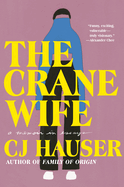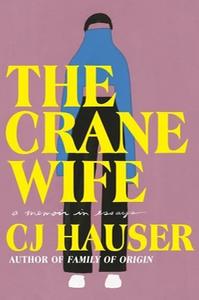
 "It has been the work of my life to build slightly firmer boundaries around myself so that I can figure out where I end and the people I love begin," writes CJ Hauser (The From-Aways; Family of Origin) in "Hepburn Qua Hepburn," one of the standout pieces collected in the perceptive and witty The Crane Wife: A Memoir in Essays. While readers are rooting for Hauser, they won't want her to shore up those boundaries too much: a principal pleasure of the novelist's first work of nonfiction is the fact that she's "a kind of joyful sponge for the affectations and interests of the people I love."
"It has been the work of my life to build slightly firmer boundaries around myself so that I can figure out where I end and the people I love begin," writes CJ Hauser (The From-Aways; Family of Origin) in "Hepburn Qua Hepburn," one of the standout pieces collected in the perceptive and witty The Crane Wife: A Memoir in Essays. While readers are rooting for Hauser, they won't want her to shore up those boundaries too much: a principal pleasure of the novelist's first work of nonfiction is the fact that she's "a kind of joyful sponge for the affectations and interests of the people I love."
The people from whom Hauser has been soaking up bits of identity are frequently the products of someone else's imagination. In the abovementioned "Hepburn Qua Hepburn," Hauser ruefully explains the significance of one of the eligible bachelors in her longtime favorite film, George Cukor's screwball-romance classic The Philadelphia Story: "I've spent most of my life dating Macaulay Connors. Because what I believed when I was thirteen, and for many years afterward, was that this was what love was about. This kind of one-soul-seeing-another-soul synchronicity." Hauser has also turned to the small screen for guidance. In "Mulder, It's Me," she finds in The X-Files, Chris Carter's television supernova, a pathway to understanding her romantic misadventures through the diametrically opposed main characters: "I became convinced that this was what had gone wrong in my last relationship: I had been a Scully dating a Scully." Until she realized she's actually a Mulder.
Taken together, the components of The Crane Wife tell the story of a late-30-something woman's lifelong, traumatic-breakup-riddled search for her true romantic and sexual self. The collection's title essay, which gained a wide readership when it appeared in the Paris Review, is about a trip that Hauser took to the Gulf Coast of Texas to study the whooping crane 10 days after calling off an engagement. Perhaps it was foreordained that the road to romantic fulfillment would be rocky. In one of the charged vignettes that comprise "Blood: Twenty-Seven Love Stories," Hauser writes this of her and her sister's inability to keep alive the cacti their parents brought home from a trip for their young daughters: "Our parents exchange a look. As if they know already that love will not be easy for us." But for readers, Hauser's agony is, if not ecstasy, then enchanting. --Nell Beram, author and freelance writer
Shelf Talker: Collectively, this perceptive and witty offering's components tell the story of a late-30-something woman's lifelong search for her true romantic and sexual self.

